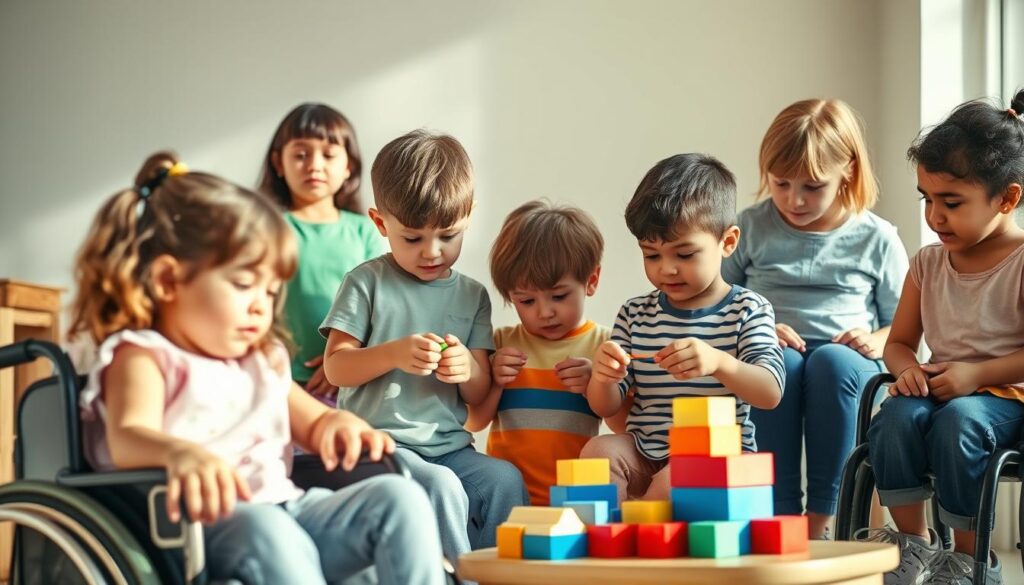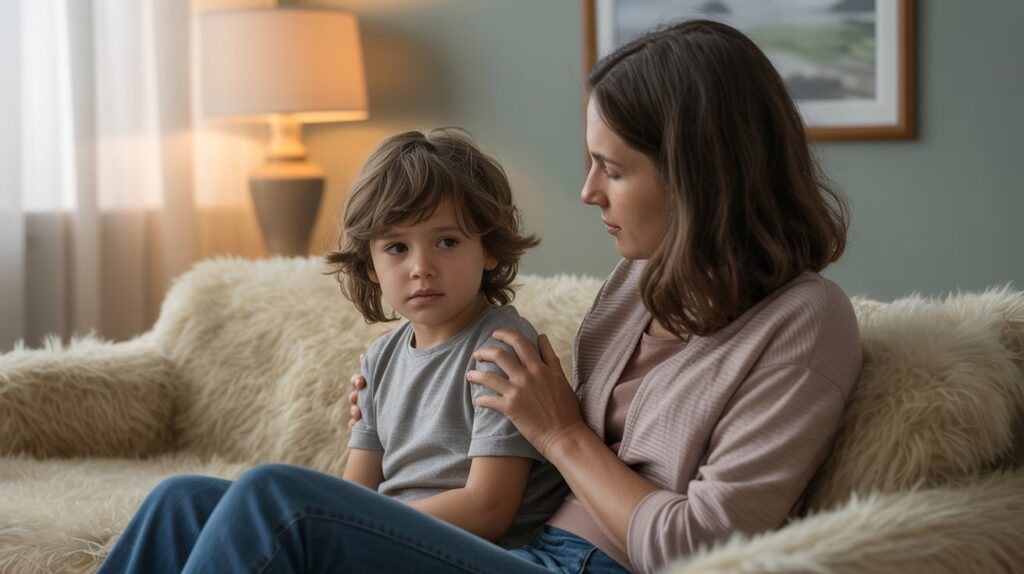We know how important therapy and mental health support are for kids with disabilities. These help them face their challenges and grow emotionally. By knowing what each child needs, we can help them thrive.
We want to teach families and caregivers about these options. This way, they can make the best choices for their kids. We aim to create a supportive environment for all.
Key Takeaways
- Understanding the unique needs of children with disabilities is key.
- Therapy can greatly help with emotional and behavioral issues.
- Families are essential in fighting for mental health support.
- Custom plans are vital for effective therapy.
- Community and online resources can greatly help families.
Understanding Disabilities in Children
Learning about disabilities in kids helps us support them better. Disabilities can affect their feelings, thinking, and body. It’s key to know the common types and signs of disabilities. This knowledge helps us act fast, improving life for kids with disabilities and their families.
Common Types of Disabilities
Children with disabilities face many challenges. Some common ones include:
- Physical disabilities, like trouble moving or health issues.
- Intellectual disabilities, affecting how they learn and think.
- Emotional disorders, like anxiety or depression, shown in behavior.
- Developmental disorders, such as autism and ADHD.
Recognizing the Signs of Disability
Spotting early signs of disabilities is vital. Parents and caregivers should watch for:
- Slow speech or trouble with words.
- Hard time making friends or connecting with others.
- Struggling with everyday tasks or routines.
- Often feeling sad or angry.
Knowing these signs lets us act early. Working together with schools, doctors, and families helps kids with disabilities. It makes a supportive space for them.

Benefits of Therapy for Children with Disabilities
Therapy is key for kids with disabilities to keep their mental health strong. It gives them tools to deal with tough emotions and behaviors. Studies show therapy can really help kids behave better, manage their feelings, and live a happier life.
How Therapy Can Help with Emotional and Behavioral Challenges
Kids with disabilities face special emotional and behavioral struggles. Therapy uses special methods to help them cope in healthy ways. For example, therapy helps kids deal with anger or frustration better.
It also gives them a safe place to talk about their feelings. This helps them grow emotionally without fear of being judged.
Types of Therapy Available
There are many therapies for kids with disabilities. Knowing about them helps us choose the best one for our child. Here’s a quick look at some effective therapies:
| Type of Therapy | Description | Best For |
|---|---|---|
| Cognitive Behavioral Therapy (CBT) | Changes negative thoughts and behaviors. | Children with anxiety, depression, or behavioral issues. |
| Dialectical Behavioral Therapy (DBT) | Combines CBT with mindfulness. | Children with emotional and social challenges. |
| Behavior Therapy | Uses rewards to encourage good behavior. | Children with disruptive behaviors. |
| Play Therapy | Uses play to express feelings. | Younger kids who find it hard to talk about their feelings. |

By choosing therapy, we give kids the tools to overcome their challenges. Finding the right therapy can greatly improve their mental health and happiness. Understanding and tackling these issues helps our kids have a better future.
Therapy and Mental Health Support for Special Needs Children
Creating effective therapy for children with special needs requires plans that fit each child’s unique needs. These plans use personalized approaches and the help of medical experts. Family involvement is key in making these plans, ensuring they meet the child’s specific needs and preferences.
Individualized Support Plans
Support plans for children with disabilities are made to fit their developmental stages. They set clear goals and strategies for therapy. This helps therapists and families work together better.
Regular updates and changes to these plans help improve therapy results. This teamwork helps children do well in their therapy.
Effective Therapeutic Modalities
There are many effective therapy methods for special needs children. These include cognitive behavioral therapy, play therapy, and art therapy. Each method has its own goals to help with emotional and behavioral challenges.
Therapy techniques are chosen based on the child’s needs. This approach helps us support children in a way that works best for them.
Finding Family Resources for Supporting Children with Disabilities
Finding the right family resources is key for supporting kids with disabilities. There are many ways to help parents deal with educational and financial hurdles. Knowing about the Individuals with Disabilities Education Act (IDEA) is very helpful.
This law helps families get a free education that fits their child’s needs. It’s a big step in making sure kids get the support they deserve.
Understanding the Individuals with Disabilities Education Act (IDEA)
IDEA is a law that makes sure kids with disabilities get the education they need. It ensures kids get a plan that’s made just for them. This helps them overcome their challenges.
Through IDEA, families can find important disability services. These services are key to helping kids succeed in school.
Financial Aids and Support Systems
Families often look for financial help to cover disability costs. Programs like Supplemental Security Income (SSI) offer financial support. This helps families meet their child’s special needs.
By knowing about these financial resources, we can better support our children. This ensures they get the care they need.
Community and Online Resources for Families
There are many community resources that offer great support. Parent Training and Information Centers (PTIs) provide direct help and advice. They guide families through the educational system.
Online platforms are also great resources. They connect families with others who face similar challenges. They share information about local disability services too.
Conclusion
Our journey into disability and the support for children with disabilities shows how vital these resources are. They help these kids have a better life. Knowing about different disabilities helps us see the special needs of each child.
By focusing on therapy, we can tackle emotional and behavioral issues. This lets our children grow and succeed.
We also need to talk about the importance of knowing about family resources. The Individuals with Disabilities Education Act (IDEA) is key in making sure kids get the help they need. It’s important to share information about financial and community support to help families.
It’s our duty as families, professionals, and communities to help kids with disabilities succeed. By working together and understanding each child’s needs, we can make sure they reach their highest goals.



